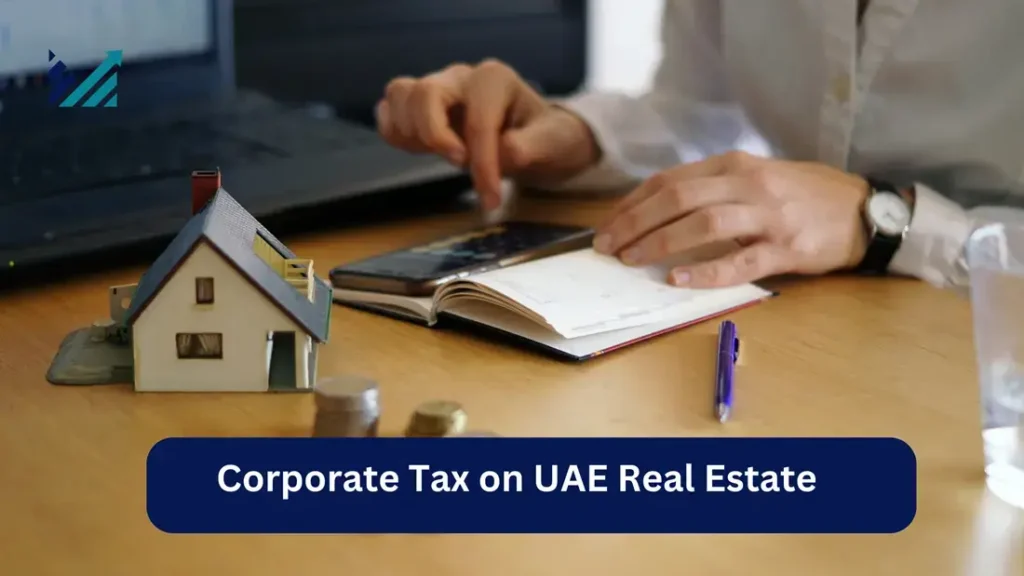
The United Arab Emirates (UAE) remains a magnet for global investors and businesses, thanks to its vibrant economy, strategic location, and investor-friendly environment. However, navigating the corporate tax landscape, particularly concerning real estate and immovable property, is essential for foreign companies operating within the UAE. This guide offers a comprehensive overview of corporate tax on UAE real estate as of 2025, equipping businesses with the knowledge needed for effective tax planning.
Corporate Tax Rate for Real Estate Income in UAE 2025
As of January 1, 2025, the UAE has implemented a corporate tax framework that includes:
- Standard Corporate Tax Rate: A 9% tax rate applies to businesses with annual taxable income exceeding AED 375,000.
- Domestic Minimum Top-up Tax (DMTT): In alignment with global tax standards, the UAE introduced a DMTT effective January 1, 2025. This ensures that large multinational enterprises (MNEs) with consolidated global revenues of €750 million or more pay a minimum effective tax rate of 15% on their profits.
These rates apply to income generated from both commercial and residential properties, focusing on the income produced rather than the property’s value. The taxation encompasses businesses that own or lease real estate in the UAE, including foreign companies and non-resident entities.
Mechanics of UAE Corporate Tax on Real Estate
The corporate tax on real estate income is calculated on a net basis, allowing deductions for expenses incurred in generating the income. Deductible expenses include:
- Depreciation: Allocating the cost of the property over its useful life.
- Interest: Interest expenses related to financing the property.
- Operational Costs: Expenses such as maintenance, utilities, and management fees.
Businesses are required to file a tax return and settle their tax liabilities within nine months following the end of the tax year. To avoid penalties, all businesses, including foreign companies, must register for corporate tax within one year of commencing operations. Implementing proper tax planning strategies is crucial to mitigate the risk of penalties and ensure compliance.
Tax Treatment Based on Property Categories
Understanding the classification of properties is vital for effective corporate tax planning in the UAE:
- Non-Exclusive Properties: This category includes properties such as hotels, motels, serviced apartments, and other accommodations not used exclusively as residences. Income from these properties is subject to the standard corporate tax rate.
- Commercial Properties in Free Zones: For properties located in free zones, tax treatment varies based on the status of the property owner. If both the property owner and the party conducting transactions qualify as a Qualifying Free Zone Person (QFZP), the income from such properties may benefit from preferential tax rates, potentially as low as 0%.
- Commercial Property on the Mainland: Properties situated on the mainland or in free zones owned by entities that do not qualify as QFZPs are subject to the standard corporate tax rate on income derived from these properties.
Proper classification of properties enables businesses to develop effective real estate tax strategies and ensure compliance with UAE tax regulations.
Corporate Tax Obligations for Foreign Entities
Recent updates from the UAE Ministry of Finance have expanded the corporate tax scope to include foreign businesses and non-resident entities earning income from real estate in the UAE. Specifically, foreign legal entities generating income from immovable property in the UAE are considered to have a nexus in the state and are subject to corporate tax on such income.
Exemptions and Reliefs
Certain exemptions and reliefs are available under the UAE corporate tax regime:
- Investment in Real Estate by Individuals: Income earned by individuals from real estate investments in their personal capacity is generally exempt from corporate tax, provided it is not part of a licensed business activity.
- Qualifying Investment Funds: Funds such as Real Estate Investment Trusts (REITs) and other qualifying investment vehicles may be exempt from corporate tax if they meet specific conditions related to transparency, beneficial ownership, and regulatory compliance.
Understanding these exemptions and structuring investments accordingly can help optimize tax liabilities and enhance the profitability of real estate ventures in the UAE.
Conclusion
The UAE’s corporate tax regime for real estate and immovable property has undergone significant changes, aligning with international tax practices and enhancing the country’s appeal as a global investment hub. Foreign companies and investors must stay informed about these developments to ensure compliance and optimize their tax positions. Consulting with experienced audit professionals in UAE familiar with the UAE’s regulatory landscape is advisable for tailored guidance and effective tax planning strategies.

